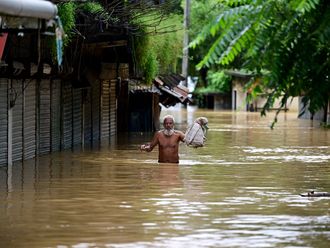Baghdad: Violence appears to have increased sharply since US troops left Iraq a month ago, as insurgents have unleashed a wave of furious bombings targeting Baghdad neighbourhoods, Shiite pilgrims and police facilities in Sunni areas.
The deadly attacks have roots not only in the troops' departure but also in a domestic political crisis that erupted in its wake. Shiite and Sunni leaders have squared off in a power struggle, one that analysts say insurgents are trying to turn into a full-scale civil war.
How the politicians handle their own mess, and the attacks, will determine Iraq's ability to hold itself together. "They are not arbitrary attacks. They are sending messages that security is not under control," said Wathiq Al Hashimi, an analyst in Baghdad who leads the Iraqi Group for Strategic Studies.
Al Hashimi and others said insurgents are also trying to exploit the political crisis between Shiite and Sunni leaders that has deadlocked the government. With each attack, the insurgents are trying to convince militias from each sect to take up arms and start attacking each other.
Critical
Before their departure, US troops had ceded control of the country's security to Iraqi forces. But the Americans' presence remained critical, analysts said, because they shared intelligence capabilities with their Iraqi counterparts and their visibility signalled that the Americans had influence over Iraq's leaders.
After the US exit, "what changed is a mind-set," said Michael Knights, an Iraq expert at the Washington Institute for Near East Policy who has been a consultant to the Defence Department.
"The US was now definitely gone. Therefore, all bets are off."
Knights worked in Iraq during the war and said commanders always assumed that Sunni extremists would launch at least some attacks after US forces left. What amped everything up, he said, was the eruption of a sectarian political crisis that generated both fear and opportunity among insurgents.
"It's like a perfect storm," Knights said.
In Washington, a senior Obama administration official said that while there had been several large attacks recently, they had not altered a pattern of cyclical violence over the past two years.
Similar upticks, he said, occurred when US forces exited Iraqi cities in 2009 and during other changes in the US profile there.
"It's always a mistake to look at these things in the isolation of one or two weeks," said the official, who agreed to speak about internal Iraqi affairs on condition of anonymity.
Referring to Al Qaida in Iraq and other groups, the official said, "I imagine some of them saying to themselves, ‘the American troops are gone,' and trying to create this narrative" that a security void has been created.
"But it's something they have tried on a regular basis at different points."
—












